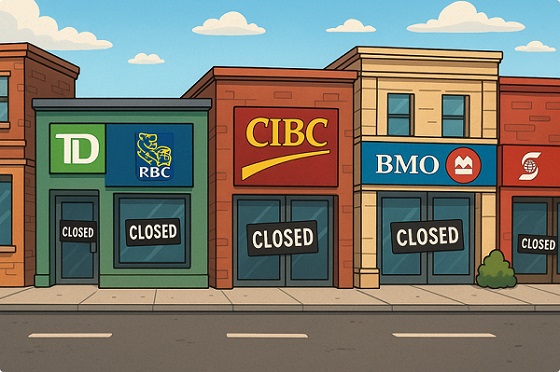Censorship Industrial Complex
‘Authoritarian censorship’: Poilievre denounces nurse’s suspension for opposing gender ideology

From LifeSiteNews
Conservative leaders, including Pierre Poilievre, are defending British Columbia nurse Amy Hamm, who was fined over $93,000 and suspended for stating gender is based on biology.
Conservatives are coming to the defense of British Columbia nurse Amy Hamm after was fined over $93,000 for saying gender is based on biology.
In an August 20 post on X, Conservative Party leader Pierre Poilievre denounced a ruling by the British Columbia College of Nurses and Midwives (BCCNM) that mandated Hamm pay $93,639.80 in legal fees and suspended her license for one month for her statements opposing LGBT ideology.
“A nurse with a spotless track record gets fined and suspended for pointing out there are two genders, and for praising world renowned author & women’s rights advocate
@jk_rowling,” Poilievre declared.
“This is authoritarian censorship,” he warned. “We must restore free speech and free thinking in a free country.”
Many other Conservative Members of Parliament (MPs) also came to Hamm’s defense, condemning the actions taken against her as censorship while voicing concerns over the implications of punishing professionals for publicly voicing their opinions.
“Fining a nurse $93,000 for acknowledging biological sex is punishing her for recognizing a scientific reality required to safely practice medicine,” MP Leslyn Lewis wrote on X. “We cannot ignore that in medicine, biological sex matters.”
“Nurses and doctors have to distinguish between sex and gender in order to treat patients safely — for example, when prescribing medications, diagnosing conditions, or determining appropriate procedures,” she added.
Additionally, Lewis raised concerns over “whether a professional can safely do their job if they are punished for acknowledging biological realities.”
Similarly, MP Andrew Scheer called the ruling “completely unjust,” adding that “everyone who cares about free speech should be outraged!”
Scheer quoted a 1926 warning from British author G.K. Chesterton that read, “We shall soon be in a world in which a man may be howled down for saying that two and two make four, in which people will persecute the heresy of calling a triangle a three-sided figure, and hang a man for maddening a mob with the news that grass is green.”
In March, a ruling from the BCCNM disciplinary panel found that Hamm committed “unprofessional conduct” by publicly discussing the dangers of the LGBT agenda in three articles and a podcast appearance.
Later that month, Hamm shared on social media that Vancouver Coastal Health fired her from her nursing position without severance after she was found guilty of “unprofessional conduct.”
Hamm found herself targeted by the BCCNM in 2020 when she co-sponsored a billboard reading, “I (heart) JK Rowling.” This sign was a nod to the famous British author’s public comments defending women’s private spaces from being used by gender-confused men.
The BCCNM accused Hamm of making “discriminatory and derogatory statements regarding (so-called) transgender people” while identifying herself as a nurse or nurse educator.
According to the college, Hamm’s statements were “made across various online platforms, including but not limited to podcasts, videos, published writings, and social media” between July 2018 and March 2021.
In July, Hamm filed human rights complaints with the British Columbia Human Rights Tribunal to hold both organizations accountable for targeting her over her beliefs. She has since announced that she is taking her case to the British Columbia Supreme Court.
Censorship Industrial Complex
Decision expected soon in case that challenges Alberta’s “safe spaces” law

The Justice Centre for Constitutional Freedoms announces that the Alberta Court of Appeal will soon release its decision in a case challenging whether speaking events can be censored on the basis of potential “psychological harm” to an audience, infringing Charter-protected freedoms of expression (section 2(b) and peaceful assembly (section 2(c).
This case stems from the University of Lethbridge’s January 30, 2023, decision to cancel a speaking event featuring Dr. Frances Widdowson, who has frequently challenged established narratives on Indigenous matters.
In written argument filed in 2024 the University claimed it cancelled the event, in part, because it had obligations under Alberta’s Occupational Health and Safety Act to ensure a workplace free of “harassment” and free of hazards to “psychological and social wellbeing.”
Lawyers argue that these provisions (which might be described as a “safe spaces” law) compel employers to censor lawful expression under threat of fines or imprisonment.
Constitutional lawyer Glenn Blackett said, “Safe spaces provisions are a serious threat to Charter freedoms. Employers who don’t censor ‘unsafe’ speech are liable to be fined or even jailed. This isn’t just the government censoring speech, it is the government requiring citizens to censor one another.”
Given the University’s defence, lawyers asked the Court of King’s Bench of Alberta to allow an amendment to the lawsuit to challenge the constitutionality of the “safe spaces” laws. However, the Court denied the request. According to the Court’s apparent reasoning because the safe spaces law is worded vaguely and generally, it is immune from constitutional challenge.
Mr. Blackett says, “I think the Court got things backwards. If legislation infringes Charter rights in a vague or general way, infringements become impossible to justify – they don’t become Constitution-proof.”
Widdowson and co-litigant Jonah Pickle appealed the ruling to the Alberta Court of Appeal, which heard argument on Monday. A decision from the Court of Appeal is expected soon.
Banks
Debanking Is Real, And It’s Coming For You

From the Frontier Centre for Public Policy
Marco Navarro-Genie warns that debanking is turning into Ottawa’s weapon of choice to silence dissent, and only the provinces can step in to protect Canadians.
Disagree with the establishment and you risk losing your bank account
What looked like a narrow, post-convoy overreach has morphed into something much broader—and far more disturbing. Debanking isn’t a policy misfire. It’s turning into a systemic method of silencing dissent—not just in Canada, but across the Western world.
Across Canada, the U.S. and the U.K., people are being cut off from basic financial services not because they’ve broken any laws, but because they hold views or support causes the establishment disfavors. When I contacted Eva Chipiuk after RBC quietly shut down her account, she confirmed what others had only whispered: this is happening to a lot of people.
This abusive form of financial blacklisting is deep, deliberate and dangerous. In the U.K., Nigel Farage, leader of Reform UK and no stranger to controversy, was debanked under the fig leaf of financial justification. Internal memos later revealed the real reason: he was deemed a reputational risk. Cue the backlash, and by 2025, the bank was forced into a settlement complete with an apology and compensation. But the message had already been sent.
That message didn’t stay confined to Britain. And let’s not pretend it’s just private institutions playing favourites. Even in Alberta—where one might hope for a little more institutional backbone—Tamara Lich was denied an appointment to open an account at ATB Financial. That’s Alberta’s own Crown bank. If you think provincial ownership protects citizens from political interference, think again.
Fortunately, not every institution has lost its nerve. Bow Valley Credit Union, a smaller but principled operation, has taken a clear stance: it won’t debank Albertans over their political views or affiliations. In an era of bureaucratic cowardice, Bow Valley is acting like a credit union should: protective of its members and refreshingly unapologetic about it.
South of the border, things are shifting. On Aug. 7, 2025, U.S. President Donald Trump signed an executive order titled “Guaranteeing Fair Banking for All Americans.” The order prohibits financial institutions from denying service based on political affiliation, religion or other lawful activity. It also instructs U.S. regulators to scrap the squishy concept of “reputational risk”—the bureaucratic smoke screen used to justify debanking—and mandates a review of past decisions. Cases involving ideological bias must now be referred to the Department of Justice.
This isn’t just paperwork. It’s a blunt declaration: access to banking is a civil right. From now on, in the U.S., politically motivated debanking comes with consequences.
Of course, it’s not perfect. Critics were quick to notice that the order conveniently omits platforms like PayPal and other payment processors—companies that have been quietly normalizing debanking for over a decade. These are the folks who love vague “acceptable use” policies and ideological red lines that shift with the political winds. Their absence from the order raises more than a few eyebrows.
And the same goes for another set of financial gatekeepers hiding in plain sight. Credit card networks like Visa, American Express and Mastercard have become powerful, unaccountable referees, denying service to individuals and organizations labelled “controversial” for reasons that often boil down to politics.
If these players aren’t explicitly reined in, banks might play by the new rules while the rest of the financial ecosystem keeps enforcing ideological conformity by other means.
If access to money is a civil right, then that right must be protected across the entire payments system—not just at your local branch.
While the U.S. is attempting to shield its citizens from ideological discrimination, there is a noticeable silence in Canada. Not a word of concern from the government benches—or the opposition. The political class is united, apparently, in its indifference.
If Ottawa won’t act, provinces must. That makes things especially urgent for Alberta and Saskatchewan. These are the provinces where dissent from Ottawa’s policies is most common—and where citizens are most likely to face politically motivated financial retaliation.
But they’re not powerless. Both provinces boast robust credit union systems. Alberta even owns ATB Financial, a Crown bank originally created to protect Albertans from central Canadian interference. But ownership without political will is just branding.
If Alberta and Saskatchewan are serious about defending civil liberties, they should act now. They can legislate protections that prohibit financial blacklisting based on political affiliation or lawful advocacy. They can require due process before any account is frozen. They can strip “reputational risk” from the rulebooks and make it clear to Ottawa: using banks to punish dissenters won’t fly here.
Because once governments—or corporations doing their bidding—can cut off your access to money for holding the wrong opinion, democracy isn’t just threatened.
It’s already broken.
Marco Navarro-Genie is vice-president of research at the Frontier Centre for Public Policy and co-author, with Barry Cooper, of Canada’s COVID: The Story of a Pandemic Moral Panic (2023).
-

 Censorship Industrial Complex1 day ago
Censorship Industrial Complex1 day agoFreedom of speech under threat on university campuses in Canada
-

 Alberta20 hours ago
Alberta20 hours agoOttawa’s destructive federal energy policies and Premier Danielle Smith’s three part solution
-

 Business1 day ago
Business1 day agoCarney engaging in Orwellian doublethink with federal budget rhetoric
-

 Alberta1 day ago
Alberta1 day agoIs Alberta getting ripped off by Ottawa? The numbers say yes
-

 Energy1 day ago
Energy1 day agoCanada’s LNG breakthrough must be just the beginning
-

 Business1 day ago
Business1 day agoCourt’s ‘Aboriginal title’ ruling further damages B.C.’s investment climate
-

 Business1 day ago
Business1 day agoManitoba Must Act Now To Develop Its Northern Ports
-

 Agriculture19 hours ago
Agriculture19 hours agoIn the USA, Food Trumps Green Energy, Wind And Solar



